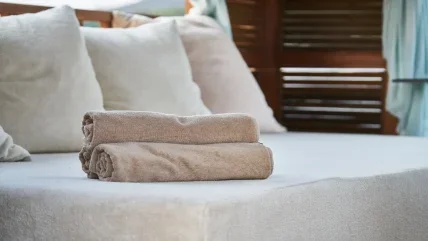
Boasting just 49 bedrooms, The Capital has long presented itself as ‘a grand hotel in miniature’. Family-owned and resolutely old school, in over 40 years of service, founder David Levin has refused to cater to the whims of the latest fashions or trends.
This is not a hotel where you’ll find the concierge wearing jeans or electronic music being piped out in the lobby; it feels like a throwback to the days before ‘white-gloved service’ became a popular byword for all that is anachronistic. Over the years, such steadfastness has served the hotel well and this privately owned luxury townhouse, sitting almost in the shadow of Harrods in Knightsbridge, enjoys a stature among London’s elite addresses that belies its size. This has been in no small part down to The Capital’s well-established reputation as an exemplary fine-dining destination. Within two years of opening in 1971, it became one of the city’s first three hotels to win a Michelin Star. Gary Rhodes would later receive the same accolade running the kitchen and, under Eric Chavot’s guidance, it was awarded a second star in 2005.
From Cornwall to Knightsbridge
But following Chavot’s departure in 2009, the restaurant’s reputation dipped, losing its Michelin status and struggling for air within the overcrowded fine-dining mecca that is London SW1. Levin and his daughter, Kate, who serves as general manager, decided it was time for a radical change.
The man charged with implementing the transformation may sound like the romantic lead from a Mills & Boon novel, but the love affair for which Nathan Outlaw is known lies with the ocean. Proprietor of the UK’s only Michelin-starred fish restaurant – and Europe’s only chef cooking exclusively seafood to hold two Michelin stars – he has been based for many years on England’s remote Cornish coast.
Despite such star status and a growing media profile, there had previously been very little talk of Outlaw coming to London, the general assumption being that he was more than content with his lot. On meeting the chef, it quickly transpires that such assumptions were not far from the truth. This was only the latest in a series of invites to set up shop in the city.
"In the past, it’s usually been the possibility of opening 200-cover brasseries," he says, taking a seat in the hotel bar following a busy Wednesday lunch service. "When Mr Levin invited me to have a look at the restaurant, my initial response was, ‘No, it’s not for me’. I thought the whole London thing would be one of those shallow exercises in brand-building. But he convinced me to visit and as soon as I walked in, I got very excited."
An unlikely pairing?
At first glance, the partnership between chef and hotel might not appear the most natural of marriages. Outlaw is famed for a lack of pomp and pretension; he’s a big, generous chef who refutes talk of ‘art’ or culinary philosophies. The Capital, meanwhile, is a destination that has always promoted formality and a strong sense of decorum. Outlaw acknowledges the marked differences, but insists that what ultimately attracted him were the shared core values that he quickly identified with the proprietor.
"The Capital is a family-run business and that’s how I’ve always operated – the guys I employ have worked with me for a very long time," he explains. "Everyone knows where we’re at and what we’re aiming for, and it’s exactly the same here. I liked the idea of not having to sit down in front of a board to sell myself or explain my achievements. They’ve created something very special and that’s something I want to respect, support and build on."
Some change on the part of the hotel was also required. Outlaw describes his cuisine as "sophisticated, but not posh" and the restaurant has done away with fripperies and linens as part of an effort to transform the overall service dynamic.
"The food is the easy part," says Outlaw. "I’m really trying to get front of house to relax a little bit; many of them have been drilled into that excessively fine-dining experience. They now need to reflect what I’m all about and that’s a real challenge."
To help ease the transition, Outlaw imported key members from his Cornwall team. The sommelier was previously his restaurant manager and, in the kitchen, long-term lieutenant Pete Biggs, who was head chef at the more informal of his two Cornwall operations, The Seafood & Grill by Nathan Outlaw, leads the brigade.
A hands-on chef
"Pete’s been working with me for ten years," explains Outlaw, who spends two days a week cooking in the London kitchen. "If he had said no to this opportunity, then we probably wouldn’t have gone through with it, but he’s rejuvenated by the whole experience. It’s also allowed everybody down in Cornwall to move up a place and I’m spending more time cooking than ever. I think it’s surprised a lot of the guys here that I’m in the kitchen so much and it’s not just a question of popping in once a month to hand out a bollocking."
This is a business model Outlaw has witnessed in the past, big-name chefs installing their names above the door without investing any time at the stove.
"I’ve seen cases where they’re virtually holding the hotel to ransom," he says. "When you’re working within a hotel, you can’t afford to be selfish and you can’t afford to alienate anyone – if Mrs Jones wants a steak and chips, then we have to be open to that. Down in Cornwall, you’ll see my guys scrubbing toilets or making a sandwich for a guest who’s just checked in. That’s quite rare, but we’re in the hospitality game and you have to deliver the whole package.
Cuisine with style and substance
Outlaw’s two Cornish restaurants are housed in Rock’s luxury St Enodoc Hotel. The Grill & Seafood also caters for those diners with a preference for land-reared flesh, but the 20-cover Restaurant Nathan Outlaw makes no such compromises, eschewing a la carte and exclusively serving a multi-course seafood tasting menu (vegetarians are also catered for). Outlaw’s At The Capital represents an effort to marry both concepts under one roof.
"Mr Levin has given me complete control, but we’ve got to please the regulars as well as those who know me for my work down in Cornwall," he explains. "The menu changes each week and I’m a believer in a signature style rather than signature dishes – the danger with signature dishes is that they can keep you rooted in the past. There is meat on the menu – one starter and one main – but we’ve hardly sold any. It’s the dishes you won’t find anywhere else, the quality of the seafood and the tasting menu that’s our real strength."
Over the last few years, Outlaw has become an ambassador for fish consumption in the UK. His eyes light up as the conversation turns to the sea and it is an obsession he can trace back to formative experiences just a few steps from the entrance to his new restaurant.
A fascination with fish
"As kids, we used to come up to London every Christmas to look at the Harrods fish display," he explains. "Fish is a fascinating subject and a bit of an obsession. From the start of my time in the kitchen, I’ve always found myself gravitating towards the seafood section. By the time I opened my own place, there wasn’t a species I hadn’t prepped, cooked or eaten."
Outlaw first moved to Cornwall to work for Rick Stein, perhaps the most high-profile champion of seafood in the UK. Willingly or not, it is a mantle Outlaw appears to have inherited and a hint of frustration enters his voice as we discuss popular misconceptions among large swathes of the population.
"It’s madness that as an island we don’t see more fish restaurants and that I’m the only guy with any stars," he says. "There’s a huge amount of misinformation out there regarding subjects such as sustainability, but the only guys I listen to are the fishermen. In the past, they’ve arguably shot themselves in the foot by championing premium species at the expense of other varieties, such as mackerel, pollock and grey mullet. Fish cookery is also perceived as difficult, but for me it’s a convenience food – most of the time you can have it ready and on the plate in a couple of minutes. I want people to see how easy it can be."
If the toque fits
When not proselytising, Outlaw is also keen on furthering his own education and is taking full advantage of the top dining spots within easy walking distance of the hotel.
"Pierre Koffman got in touch early on letting me know that if I ever needed a cup of sugar he was only down the road," Outlaw says. "I’ve eaten at his restaurant in the Berkeley, been to Dinner by Heston Blumenthal a few times and plan on visiting Bar Boulud [both at the Mandarin Oriental]. The other week, I caught the end of a meal by April Bloomfield [head chef at New York’s Spotted Pig] at the St John Hotel – it was some of the best food I’ve ever had. My time has been spent just eating and cooking – I’m absolutely loving it."
But such excitement should not be interpreted as signalling plans for further expansion. Outlaw refuses to rule out the possibility entirely, but any new restaurant will have to operate without him standing behind a stove.
"If the opportunity arises, we might look at it and if someone in the team needs to make that step, I’m here to offer help and support," he says. "What I’m not interested in is working at other restaurants. Cornwall and London are very full on and anything more would mean I couldn’t give them enough attention. I’m a pretty laid-back guy; what I’ve already got is enough for me."
Much like The Capital, Outlaw’s empire may be small, but it’s already looking to be perfectly formed.






